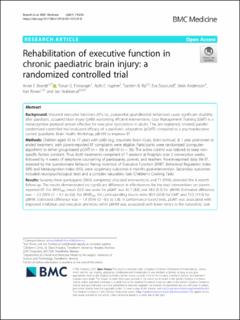| dc.description.abstract | Background Impaired executive functions (EFs, i.e., purposeful, goal-directed behaviour) cause significant disability after paediatric acquired brain injury (pABI) warranting efficient interventions. Goal Management Training (GMT) is a metacognitive protocol proven effective for executive dysfunction in adults. This pre-registered, blinded, parallel-randomized controlled trial evaluated efficacy of a paediatric adaptation (pGMT) compared to a psychoeducative control (paediatric Brain Health Workshop, pBHW) to improve EF. Methods Children aged 10 to 17 years with pABI (e.g., traumatic brain injury, brain tumour), ≥ 1 year post-onset or ended treatment, with parent-reported EF complaints were eligible. Participants were randomized (computer-algorithm) to either group-based pGMT (n = 38) or pBHW (n = 38). The active control was tailored to keep non-specific factors constant. Thus, both treatments comprised of 7 sessions at hospitals over 3 consecutive weeks, followed by 4 weeks of telephone counselling of participants, parents, and teachers. Parent-reported daily life EF, assessed by the questionnaire Behavior Rating Inventory of Executive Function (BRIEF; Behavioral Regulation Index (BRI) and Metacognition Index (MI)), were co-primary outcomes 6 months post-intervention. Secondary outcomes included neuropsychological tests and a complex naturalistic task (Children’s Cooking Task). Results Seventy-three participants (96%) completed allocated interventions and 71 (93%) attended the 6-month follow-up. The results demonstrated no significant difference in effectiveness for the two interventions on parent-reported EF: For BRIEFBRI, mean (SD) raw score for pGMT was 42.7 (8.8) and 38.3 (9.3) for pBHW. Estimated difference was − 2.3 (95% CI − 5.1 to 0.6). For BRIEFMI, the corresponding results were 80.9 (20.4) for GMT and 75.5 (19.3) for pBHW. Estimated difference was − 1.4 (95% CI −8.5 to 5.8). In performance-based tests, pGMT was associated with improved inhibition and executive attention, while pBHW was associated with fewer errors in the naturalistic task. Conclusions In pABI, metacognitive training (pGMT) did not demonstrate additional effectiveness on parent-reported daily life EF at 6-month follow-up, when compared to a psychoeducative control. Both interventions were well-tolerated and demonstrated distinct improvements at different EF assessment levels. To conclude on pGMT efficacy, larger studies are needed, including further investigation of appropriate assessment levels and possible differences in effect related to treatment duration, developmental factors, and injury characteristics.Lagt | en_US |

